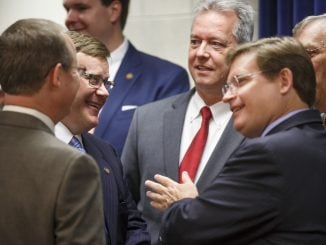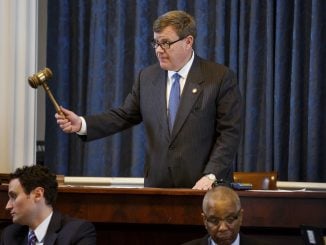RALEIGH — North Carolina government tax collections will smash the projections used to help fashion the first year of the current two-year state budget, officials announced Monday as lawmakers return next week to begin figuring out what to do with billions in surplus.
Economists at the legislature and Gov. Roy Cooper’s budget office now believe state coffers should take in $4.24 billion more in the fiscal year ending June 30 than predicted the previous June, according to a memo from the General Assembly Fiscal Research Division. That’s a nearly 15% increase, bringing overall revenues this year above $32.65 billion.
A surplus had already been predicted in February, when the Cooper administration said actual revenues through January were almost $1.4 billion ahead of previous expectations. At the time, the Office of State Budget and Management estimated overcollections of $2.4 billion by June 30.
In addition to the $4.24 billion, the consensus forecast by the executive and legislative branches now expects $1.96 billion, or nearly 7%, more will be collected in the next fiscal year starting July 1 above and beyond what was projected for the second year of the budget.
These numbers will inform Cooper and Republican budget-writers when they consider changes to the second year that were approved in November. Such adjustments are traditionally the primary job of the General Assembly when it meets in even-numbered years.
These additional revenues could lead to additional tax cuts; higher salaries; greater spending on one-time projects or permanent programs; flusher reserves for fiscal emergencies beyond what’s required; or a combination of any or all of them.
In a joint news release, Senate leader Phil Berger and House Speaker Tim Moore said the forecast “highlights the General Assembly’s winning formula of low taxes, reasonable regulations and responsible spending.”
Governors usually propose their adjustments as the session is about to start. The surplus is likely to renew calls by Cooper and others for the legislature to spend more to address inequities in public education that the plaintiffs in long-standing “Leandro” litigation have sought to address.
“Our state is strong in many ways and it’s more important than ever to build on our success by investing in good schools, quality healthcare, resilient infrastructure and clean air and water,” Cooper said in an written statement about the projections.
The spring forecast is usually released after individual and business tax returns are filed in mid-April — usually the most volatile portion of the tax year.
The division memo from economist Emma Turner says detailed descriptions about final April tax collections were not available when the forecast was completed because the state Revenue Department was still processing returns. But Turner wrote that final income tax returns in April should exceed expectations by more than $1.4 billion.
Turner said it became evident in March that state employment had returned to pre-pandemic levels last summer and had exceeded them, resulting in wage gains. That leads to higher income tax collections. Sales and use tax collections also should finish well ahead of forecast due to strong consumer spending and inflation, she wrote.
“Record-breaking stock market returns and corporate profits in 2021 were also unanticipated and generated significant revisions to the forecast,” she wrote.
The fiscal forecast does project slower economic growth. While there’s an elevated risk of a recession “given geopolitical uncertainty and evolving monetary policy by the Federal Reserve to address high inflation,” Turner wrote, the forecast “does not foresee a near-term recession.”
“It is crucial that we continue on this track of responsible and disciplined spending in light of the potential for a recession as we begin the short session budget process,” Moore and Berger added.
Republican majorities in the General Assembly still are not veto-proof, so the GOP will again attempt to win over enough Democrats on a final, negotiated budget bill, as it succeeded so in doing last fall.
The projected overcollections still are below the additional $6.2 billion the state’s coffers took in during the fiscal year that ended June 30, 2021. That surplus, however, swelled in large part because state economists kept to a conservative forecast following pandemic-related shortfalls in 2020.
Monday’s forecast already takes into account individual income tax cuts contained in the approved budget for this year and next.



